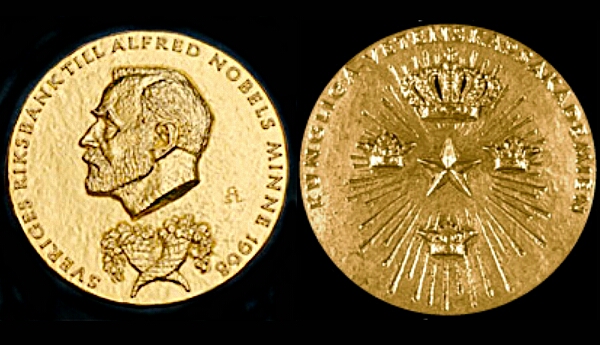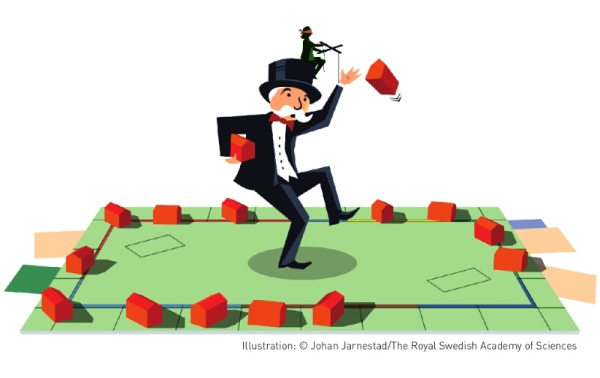Jean Tirole is the 2014 winner of the Sveriges Riksbank Prize in Economic Sciences in Memory of Alfred Nobel. Tirole, of Toulouse 1 Capitole University in France, has been awarded by the Royal Swedish Academy of Sciences “for his analysis of market power and regulation.”
A Nobel Prize for Sowing Seeds of Corporate Social Responsibility
 One of the most influential economists of our current era, Jean Tirole has won the Nobel Prize for clarifying successful methods for regulating industries controlled by an oligopoly. Left unregulated, some industries often become dominated by a small number of large firms, resulting in markets with prices higher than are reasonably justified by costs. Tirole’s contributions to marget regulation encouraged socially responsible business practices by discouraging corporate greed.
One of the most influential economists of our current era, Jean Tirole has won the Nobel Prize for clarifying successful methods for regulating industries controlled by an oligopoly. Left unregulated, some industries often become dominated by a small number of large firms, resulting in markets with prices higher than are reasonably justified by costs. Tirole’s contributions to marget regulation encouraged socially responsible business practices by discouraging corporate greed.
Prior to Tirole, traditional economic theory did not deal with the case of the oligopoly. Instead, theories presupposed a single monopoly, referred to as perfect competition. Seeking general principles applicable to all industries, early regulation researchers and policymakers proposed simple policy rules. They applied rules such as capping prices for monopolists and prohibiting cooperation between competitors, while allowing cooperation between firms occupying different positions in the value chain.
Adapting Regulations to Match Industry Conditions
Tirole’s Nobel Prize-winning work showed that such rudimentary rules work well for certain cases, but theoretically can be detrimental in others. Placing caps on prices may motivate dominant firms to reduce costs, but on the other hand caps may be excessively higher than costs, resulting in excessive profits.
Lack of information about a firm’s costs, and the quality of the goods and services they deliver, is a primary problem for a regulatory authority. The firm being regulated has a natural advantage by this hidden infirmation. Tirole showed that every industry’s specific conditions should be carefully adapted to apply the best regulation or competition policy.
Rethinking Giving Away Products for Free
By studying the conditions of specific markets, Jean Tirole has contributed further undertandings of regulation. For example, under traditional competition law, undercutting prices has been regulated. This is because setting prices below production costs is a traditional method of eliminating competitors.
But this regulation is not necessarily applicable to all markets. For example, giving away newspapers for free can increase readership. Advertisement revenue, due to large readership, covers production and distribution losses. In this business model, regulations banning undercutting are not appropriate. Similar business models making use of a free consumer product to increase revenue via third parties include search engines and social media. Credit and debit cards perform similarly, as well.
Discouraging Manipulation of Competition
Another traditional theory that Tirole overturned on his path to the Nobel Prize involved a classic dilemma. What happens when someone has a monopoly in an area that is an important link in a production chain? This age-old problem is illustrated by the modern case of a software or operating system company becoming dominant in its area. Traditionally, theories expected that firms in this case would monopolize profits, but only within the area of its own link. It was believed that competition would prevent that company from taking advantage of their position to unfairly benefit from the next link in the production chain.
In 1986 with Patrick Rey, and in 1990 with Oliver Hart, Tirole demonstrated that this belief is not justifed. In reality, a monopolist, or an oligopoly for that matter, is able to make a profit by manipulating competition in the market next door. In the case of a producer of a patented innovation that reduces production costs, stiff competition for sales would curtail excessive profits. Tirole and his partners illuminated the way in which the producer might manipulate this situation.
If the producer sells to all buyers without restraint, the stiff competition for his cost-saving innovation will require sales at a lower price. But if the producer sells to one buyer only, his product will give cost-saving advantage to only one company in that market. The buyer clearly benefits more than others in his market, strongly motivating his purchase. The producer can now charge whatever price he likes from his captive buyer. In this case, Tirole showed, the producer has now manipulated and unfairly benefitted from the next link in the production chain.
Setting Stepping-Stones to Socially Responsible Business
Drawing on all these new insights, governments can better encourage powerful firms through careful regulation. This encourages firms to become more productive and, at the same time, prevents them from manipulating competitors and customers for unfair advantage. In an effort truly worthy of the Nobel Prize, Jean Tirole has constructed a basic framework for designing socially responsible regulatory policies. These policies have subsequently been applied to many industries, ranging from banking to telecommunications.
Through the use of these, and other elegantly designed solutions for discouraging predatory business practices, Tirole earned his reputation as an astute engineer of market regulation for the benefit of society. Perhaps we can say Jean Tirole did more than win the 2014 Nobel Prize in Economics. It is clear he helped set the stepping stones of social responsibility into the muddy stream of corporate greed. Tirole and his partners laid the groundwork leading to more sustainable business models. And it is highly likely he sowed a few seeds of corporate social responsibility along the way.
(Image sources: nobelprize.org)







